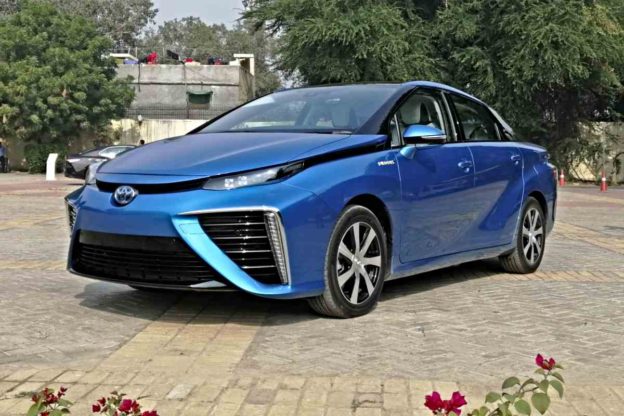Are hydrogen-powered fuel-cell electric vehicles the future? Are they better than all-electric vehicles? Do they hold more relevance in the Indian context in comparison to EVs? We answer these and many other questions related to FCEVs.
With the current environmental degradation, it has become imperative that India starts moving towards alternative fuel technologies. Though all the focus right now is on BEVs (Battery Electric Vehicles), there are several other forms of alternative fuel technologies which can be used, depending upon the travelling distance. At a recent event organised by Toyota Kirloskar Motors, in Delhi, the brand showcased its entire line-up of electric vehicles, which apart from the all-electric EQ, strong-hybrid Camry and Aqua, also had the Mirai, a fuel-cell electric vehicle (FCEV). Though much has been talked about BEVs, PHEVs (Plug-In Hybrid Electric Vehicle) and strong hybrids, the idea of a fuel-cell electric vehicle continues to be misunderstood and considered not feasible. In this article, we will try and shed some light on FCEVs, understand the technology behind them and also dwell into the role that they can play towards cleaner mobility going into the future.
What are hydrogen-powered fuel-cell electric vehicles?
A fuel-cell electric vehicle is essentially a hybrid electric vehicle wherein, the internal combustion engine is replaced with a fuel-cell stack. The onboard sources of power include hydrogen as well as an advanced battery system. The hydrogen, stored in its pure form, in high-pressure tanks, is sent through the fuel-cell wherein it is combined with oxygen, resulting in the the production of water (H2O) and electricity. The electricity produced is used directly to drive the vehicle with water being the waste and the only emission through the tail-pipe.
In simple words, unlike a battery-electric vehicle, which needs to be charged from external sources, a fuel-cell electric vehicle produces it’s electricity onboard. This drastically reduces the battery capacity and hence the dead-weight which an FCEV needs to carry. Battery-electric vehicle these days have 30-50 kWh battery packs, enabling them to average a driving range of approximately 400 km on a single charge. In comparison, an FCEV can travel distance of up to 650 km with a battery pack of less than 2 kWh. Also, unlike the charge stored in a battery, which tend to discharge within a short duration of time (hours-days), hydrogen, which is the make source of power in an FCEV, can be stored for longer durations (days-seasons). Also, refuelling of hydrogen tank takes just 2-3 minutes, much like filling your car with petrol/diesel, unlike charging a BEV which could still, with even the latest technologies, warrants at the least 30 minutes if connected to a fast-charger.
 Source: Toyota Kirloskar Motors
Source: Toyota Kirloskar MotorsHow to produce pure hydrogen needed to run an FCEV?
Well, the hydrogen can be produced through a number of sources, be it thermal, wind, solar, CNG, LNG and the likes. But the most feasible sources of hydrogen, which is also available in surplus, is biomass. India has a huge biomass reserve which is either burnt of simply goes waste. Apart from livestock dung, agriculture and forest residual and sewage sludge are also CO2 free sources from which hydrogen can be obtained. Similarly, by virtue of electrolysis, hydrogen can be produced from the 40 per cent excess electricity available through renewable resources such as wind, water, solar and Geothermal. India’s vast coal reserves can also be used for the due process.
 Source: Toyota Kirloskar Motors
Source: Toyota Kirloskar MotorsBut what are the challenges in the adoption of an FCEV?
One of the main challenges faced by FCEVs today is the high cost involved in the production of hydrogen, fuel-cell stacks and establishment of hydrogen fuel stations. The costs involved in the same only go down with technological development along with wider adoption, as is the case with most of the new technologies. To put things in perspective, in India, we currently do not have a single hydrogen fuel station. On the contrary, countries such as Japan, China, United States of America, Korea and some European countries have started to warm up to the idea of a hydrogen-based society. Apart from this, there is also the concern of safety, since hydrogen, in its pure form, is highly reactive. Once these things are addressed, in an effective and sustainable manner, we can expect FCEVs to start entering into the main-stream transportation sector.
What are your views on fuel-cell electric vehicles? Do you think they are feasible and better than battery-electric vehicles? Can they be a solution to India’s environmental problems as a whole? Do let us know in the comment section below!
https://www.financialexpress.com/auto/car-news/hydrogen-fuel-cell-vehicle-india-technology-car-working-toyota-mirai-hyundai-nexo-range/1788621/lite/





